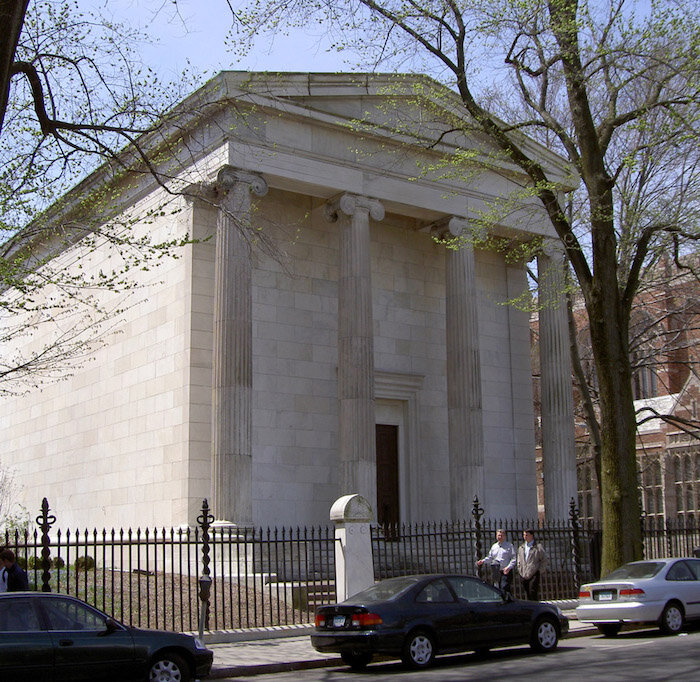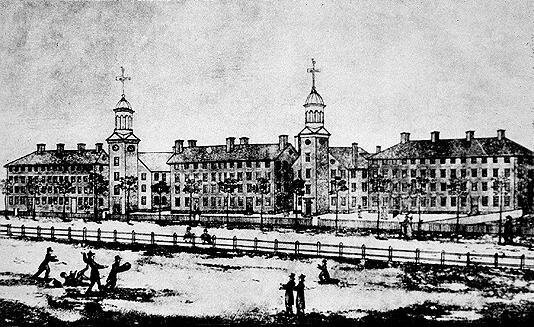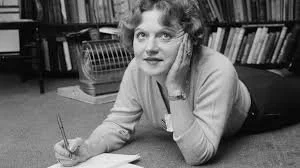There are places in our world that are believed to contain a high concentration of spiritual power—Machu Picchu, Uluru, the Great Pyramids, Stonehenge. Pilgrimages are made to these sites by people searching for something beyond the practical answers of science, the disturbing headlines of the news. These centers of power intrigue those of us who carry a secret hope that the planet harbors places of mystical energy where magic exists in our world.
Book and Snake tomb, New Haven, CT. via Commons.
In Ninth House, her first adult fantasy, Leigh Bardugo imagines one of these centers of power in a very unlikely and deeply-conflicted place—New Haven, Connecticut. On the surface Bardugo’s Yale University and New Haven are consistent with their real-world counterparts. Scenes take place within iconic landmarks like Grove Street Cemetery and Beinecke Rare Book and Manuscript Library. Secret Yale societies meet in mausoleum-like halls, most built during the 1800’s. But behind these outward appearances, eight of these secret societies are practicing magic. Bardugo calls the group the Ancient Eight or the Houses of the Veil, but uses each society’s real-world name when she refers to a specific house—Skull and Bones, Book and Snake, etc. This interweaving of fantasy and reality occurs throughout the story and serves to lure the reader subtly into believing that aspects of Bardugo’s created world are part of the real lore of Yale and New Haven.
In the story the founding members of the Houses of the Veil choose to build their tombs or halls over a specific site—a nexus of magical power. And inside their inscrutable buildings, for nearly two hundred years, the Houses of the Veil have been performing rituals that bring current members and their rich, powerful, and sometimes-famous alums, money, advantages in contract deals and espionage, and enhanced skills and abilities.
In one of the first scenes, the protagonist, Galaxy “Alex” Stern, watches a Skull and Bones ritual in which a mentally ill, transient man taken from the streets of New Haven, is drugged and cut open so that his bowels can be read for predictions of stock market prices.
Alex is a member of Lethe House, a ninth secret society that also practices magic. Lethe was created to oversee the rituals of the Ancient Eight and to protect the rituals from the ghosts (Grays) drawn to the blood, sweat and human drama that happen during a ceremony. The members of Lethe set up wards and speak lines of poetry about death to keep the Grays from breaking through the “veil” between life and the hereafter. Lethe House also acts as a watchdog, making sure that the innocent, drugged people used in the rituals survive and are properly cared for.
Skull and Bones resting on a pillow. Photograph taken from an album belonging to Harold Terry Clark Yale College Class of 1903 and member of the Skull & Bones Society delegation of the same year. Photograph courtesy of Yale Manuscripts and Archives Digital Images Database via Commons.
In her freshman year, Alex is having trouble achieving a balance between the demands of her regular studies and her responsibilities at Lethe. “Yale Alex struggled but didn’t complain. She was a good girl trying to keep up.” But Alex can’t seem to fit the typical Yale freshman profile. A high school dropout, drug user and sometimes dealer, she was living at poverty level with her abusive boyfriend in Los Angeles when she woke up in handcuffs in a hospital room, the only survivor of a multiple homicide. It was there that Alex was given a second chance in life by the dean of Lethe House who made her an offer—become a Yale student and work as a member of Lethe. Dean Sandow knew about Alex’s specific, exceptional ability—she could see Grays.
During her first days of Lethe training Alex asks her mentor, Darlington, a Yale alum who grew up part of the privileged, New Haven elite, how the city became a place of power. Darlington explains:
“In the early eighteen hundreds, magic was moving from the old world to the new, leaving Europe along with its practitioners. They needed someplace to store their knowledge and preserve its practices. No one’s certain why New Haven worked. They tried in other places too…Cambridge. Princeton. New Haven was where the magic caught and held and took root. Some people think it’s because the Veil is thinner here, easier to pierce.”
He goes on to describe the layout of New Haven’s centers of power:
“The nexuses are where the power eddies, and it’s what allows the societies’ rituals to function successfully. We’ve mapped twelve in the city. Tombs have been built on eight of them. The others are sites where structures already exist, like the train station, and where it would be impossible to build.”
Bardugo not only taps into the enigmatic weirdness of Yale’s secret societies to build her world and the conflicts that drive her story, she also draws on the deeper issues in New Haven’s troubled past. Standing like a walled compound in the middle of the city is Yale University. Darlington and Alex discuss why the walls of Old Campus were built:
“That’s what the whole college used to look like. Little buildings of red brick. Colonial. A lot like Harvard. Then after the Civil War, the walls went up. Now most of the campus is built that way, a series of fortresses, walled and gated, a castle keep.
…Why? Alex asked.
To keep the rabble out. The soldiers came back to New Haven from the war wild, most of them unmarried, a lot of them messed up from the fighting. There was a wave of immigration too. Irish, Italians, freed slaves, everyone looking for manufacturing jobs. Yale didn’t want any of it.”
Old Brick Row; from an 1807 engraving entitled: “A View of the Buildings of Yale College at New Haven” via Commons.
This system of inclusion/exclusion and the conflicts it has engendered have been a critical, ongoing issue in New Haven for more than 150 years. And Bardugo doesn’t dodge this difficult aspect of Yale’s and New Haven’s history. She intentionally creates the character of Alex Stern to represent the “rabble,” as we see in Darlington’s first impression of her: “…no high school diploma, no GED, no achievements to speak of other than surviving her own misery…”
It is exactly because Alex has survived the homelessness, poverty, domestic abuse and drug addiction of her previous life that she is desperate to hold on to the second chance Lethe and Dean Sandow have given her. And she knows this is something Darlington could never understand:
“He didn’t know how precious a normal life could be, how easy it was to drift away from average. You started sleeping until noon, skipped one class, one day of school, lost one job, then another, forgot the way that normal people did things. You lost the language of normal life. And then, without meaning to, you crossed into a country from which you couldn’t return. You lived in a state where the ground always seemed to be slipping from beneath your feet, with no way back to someplace solid…Lethe was Alex’s way back to normal.”
And then, on a Thursday, the night the Houses of the Veil perform their rituals, a local New Haven woman, Tara Hutchins, is found stabbed to death on a triangular patch of land near Yale’s famed Payne Whitney gym. When Alex, representing Lethe, shows up to investigate, the police chief tells her Tara was “town” as in not a Yale student and therefore not Lethe’s concern. Part of Alex wants to leave it at that. But another part of her cannot ignore how the police chief described Tara: She’s town. And Alex thinks:
“…the societies liked to shop town girls and boys for their experiments. It was the whole reason Lethe existed. Or a big part of it. And Alex had spent most of her life as town.”
This is the point where Alex stops trying to fit into the Yale ideal. She embraces Lethe’s charter to be “the shepherds” and calls on the skills she learned in her survival days in LA. With gritty, street-smart savvy-ness Alex begins a determined fight with the Yale establishment to find the truth about Tara’s murder.
While Bardugo calls out the inequities and conflicts between New Haven’s privileged and those she calls “town,” she doesn’t venture as far as offering any solutions. But as a Yale alum and member of the secret society Wolf’s Head during her undergraduate years, it was a bold move to put this story out in the world. In an interview with the Harvard Crimson Bardugo talks about the resistance she encountered:
“... there was a little punishment in the process of publishing this book. A lot of people didn’t want me to publish it…Some people thought I should stay in my lane and that was painful since this book is so important to me. I poured two years of my life into this book and my heart and my personal experience and, yeah, it should shock you. It should disturb you.”
Ninth House is available in hardback at your local bookstore or online. The paperback comes out in October.














Cadwell Turnbull's new novel — the first in a trilogy — imagines the hard, uncertain work of a fantastical justice.